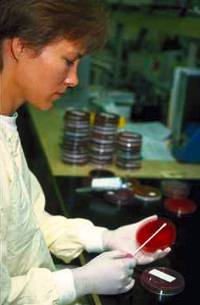31 July 2001
Living Bacteria From Space
by Kate Melville
 Evidence of living bacterial cells entering the Earth's upper atmosphere from space has come from a joint project involving Indian and UK scientists.
Evidence of living bacterial cells entering the Earth's upper atmosphere from space has come from a joint project involving Indian and UK scientists.
The first positive identification of extraterrestrial microbial life will be reported on Sunday, 29 July 2001 at the Astrobiology session of the 46th Annual SPIE meeting in San Diego, USA by Professor Chandra Wickramasinghe of Cardiff University. He will speak on behalf of an international team led by Professor Jayant Narlikar, Director of the Inter-Universities Centre for Astronomy and Astrophysics in Pune, India.
Samples of stratospheric air were collected on 21 January 2001 under the most stringent aseptic conditions by Indian scientists using the Indian Space Research Organisation's (ISRO) cryogenic sampler payload flown on balloons from the Tata Institute Balloon Launching facility in Hyderabad. Part of the samples sent to Cardiff were analysed by a team at Cardiff University led by Professor David Lloyd and assisted by Melanie Harris.
Commenting on the results, Professor Wickramasinghe said: "There is now unambiguous evidence for the presence of clumps of living cells in air samples from as high as 41 kilometres, well above the local tropopause (16 km), above which no air from lower down would normally be transported."
The detection was made using a fluorescent cyanine dye which is only taken up by the membranes of living cells. The variation with height of the distribution of such cells indicates strongly that the clumps of bacterial cells are falling from space. The daily input of such biological material is provisionally estimated as about one third of a tonne over the entire planet.
This new evidence provides strong support for the Panspermia theory of Sir Fred Hoyle and Chandra Wickramasinghe.
"We have argued for more than two decades that terrestrial life was brought down to Earth by comets and that cometary material containing microorganisms must still be reaching us in large quantities," said Professor Wickramasinghe.
